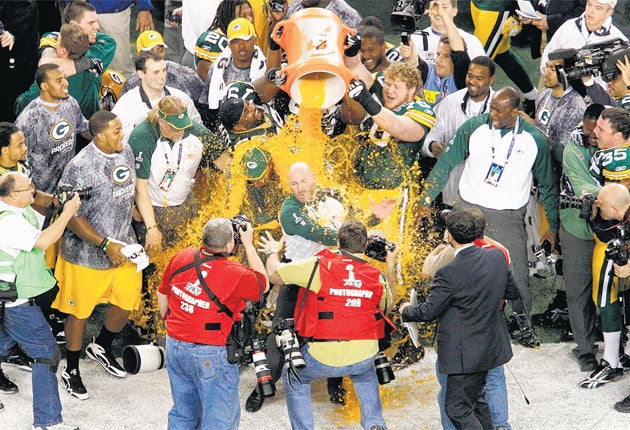Packers' Super Bowl victory could be the last NFL action of the year
Rodgers leads Green Bay to tense victory but brewing salaries dispute could lead next season to be cancelled

There was joy unconfined in northern Wisconsin, and the sour hangover of failure in Pittsburgh. But one unwelcome guest intruded at a nail-biting Super Bowl XLV: the nagging thought that Sunday's season finale might just be the last National Football League game played in calendar 2011.
Yesterday, fans lined the streets of Green Bay to welcome home the city's beloved Packers after their 31-25 triumph over the Pittsburgh Steelers at Cowboys Stadium in Arlington, Texas – the franchise's first NFL championship in 14 years and only the second since the era of master coach Vince Lombardi ended almost half a century ago.
It was by any standards an epic contest, its outcome in doubt until just 49 seconds from the end when the Steelers' last drive foundered on a fourth down incompletion. The ball was back with the Packers, and America's biggest and gaudiest sporting prize was on its way back to "Titletown".
Up to that moment, though, the game had fluctuated with stomach-churning intensity for the teams and their fans, and for a national audience here that, according to early estimates, may have been the biggest for any television programme – sports or otherwise – in US history.
The Packers surged to an early lead of 21-3, before Pittsburgh pegged them back with a touchdown on the verge of half-time. After another Steelers score early in the third period, Green Bay were wobbling, only for Aaron Rodgers to throw an eight-yard pass into the endzone to give Green Bay a 28-17 lead and renewed breathing space.
But Pittsburgh stormed back once more, with a 25-yard touchdown pass from quarterback Ben Roethlisberger, followed by a two-point conversion. Green Bay extended their lead again with a 23-yard field goal two minutes from the end, but were still not safe. Had that final drive succeeded, the Steelers might have pulled off a 32-31 victory that would have sealed the biggest comeback in Super Bowl history. It was not to be.
Instead, the star of the show – and Super Bowl XLV's most valuable player – was Rodgers, who with icy nerve and three touchdown passes, finally closed the page on his predecessor Brett Favre, and established himself as one of the game's marquee quarterbacks in his own right.
"I'm so proud of the composure he showed these last few years," Packers' running back Ryan Grant said of the 27-year-old Rodgers. "They might not stop comparing Favre and him or who-ever. But he's a champion now too, and there are only so many in the game who can say that." And whatever his legend, Favre only led the Packers to a single Super Bowl, in 1997.
Green Bay's other hero was coach Mike McCarthy, who kept the team on course through a season fraught with injuries, in which the Packers only made the play-offs as a wild card, and had to defeat each of the three NFC top seeds on the road, to book their place at Cowboys Stadium.
And in a ploy worthy of the master-motivator Lombardi himself, McCarthy had his players measured up for their Super Bowl victory rings on the day before: "No disrespect to the Steelers, but we expected to win this game. I told [the players] this was their time." And it was.
For the Steelers, though, it was a tale of mistakes, for which they were made to pay dearly. Two interceptions thrown by Roethlisberger in the first half, and a second-half fumble, proved disastrous, each turnover leading to a Packers' touchdown. "Personally, I feel like I let a lot of people down," the chastened Pittsburgh quarterback said.
But whether he will have the opportunity to redeem himself next season is far from certain. The NFL's current collective bargaining agreement expires on 31 March, and the players' union and the owners are far from in agreement on a new one.
At issue is division of the spoils of the NFL, now the richest sports league on earth with annual revenues of $9bn (£5.6bn), offering a product of which Americans cannot seem to get enough. The owners, however, feel too big a slice of that pie goes to the players, and are determined to pare it back, either by some form of cap on salaries, or by extending the regular season to 18 games from the present 16.
But the players thus far have shown no inclination to compromise, while some experts warn that extending the season by two games, in a famously violent sport, would only increase the risk of concussions and serious brain damage, which have become a growing source of concern and controversy over recent years.
All logic suggests a deal will be struck, to preserve a goose that lays such golden eggs. Protracted labour disputes, however, are far from uncommon in major league US sport, costing baseball the 1994 World Series, and ice hockey its entire 2004-05 season.
Join our commenting forum
Join thought-provoking conversations, follow other Independent readers and see their replies
Comments
Bookmark popover
Removed from bookmarks